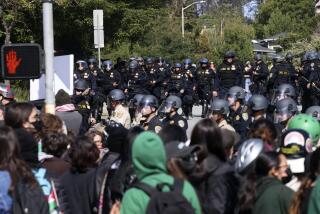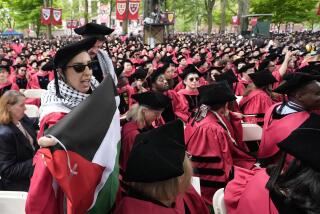From the Archives: China Vows More Democracy in Bid to Quell Protests
BEIJING -- Communist Party General Secretary Zhao Ziyang, appealing for a halt in student protests, pledged early today that China will implement democratic reforms.
“We will . . . work out concrete measures to enhance democracy and law, oppose corruption, build an honest and clean government and expand openness,” Zhao said in a message to student hunger strikers quoted by the official New China News Agency.
The message was delivered shortly after midnight to students gathered in central Beijing’s Tian An Men Square, the agency reported.
Students Reject Appeal
Student leaders announced shortly after dawn that they are rejecting Zhao’s request for a halt in the demonstrations.
Many of the students in the square said they are planning to set off on a march through Beijing around 2 p.m. today, on a route that would take them past the Diaoyutai state guest house, where visiting Soviet President Mikhail S. Gorbachev is staying, and then back to Tian An Men Square.
More than 2,000 students who have been on a hunger strike in the square--many of them since Saturday--have become the core of massive daily demonstrations. Tuesday evening, hours before Zhao’s message was announced, a huge pro-democracy rally centered on the fasting students had drawn about 150,000 demonstrators, supporters and onlookers to the square.
Zhao’s statement was issued “on behalf of all the members of the Standing Committee” of the Communist Party Politburo, according to the official news agency report.
The Politburo Standing Committee, which is the top organ of political power in China, has four other members: Premier Li Peng, Vice Premier Yao Yilin, Qiao Shi and Hu Qili. Deng Xiaoping, 84, China’s senior leader, is not a member.
Zhao said that the party and government leadership “affirmed the students’ patriotic spirit in calling for democracy and law, opposing corruption and striving to further the reform,” the news agency reported.
“We also hope that all students will exercise calm, reason, restraint and order, take the interests of the whole country into account and safeguard stability and unity,” Zhao said.
A woman student leader said that Zhao’s statement was “meaningless.”
Another hunger striker, interviewed later in the morning, said that Zhao’s promises “are about the same as he has been saying the last few days.”
‘Specific Demands’
“He hasn’t satisfied our specific demands,” this man said.
The hunger strikers are demanding that the government hold a formal televised dialogue with protest representatives to discuss the promotion of democratic reforms. Student demands also include retraction of a hard-line editorial published last month in the official party newspaper People’s Daily, which accused demonstrators of plotting to overthrow the Communist Party. The editorial is widely believed to have reflected Deng’s personal instructions.
Other key goals expressed by the students are more press freedom, improved treatment of intellectuals and an attack on corruption.
Zhao’s statement to the students came only hours after he publicly revealed to the nation that when Deng, China’s top leader since 1978, stepped down from the Communist Party Politburo two years ago, a formal decision was made that “on the most important issues, we still need him at the helm.”
This was “an extremely important decision” that had never been announced before, Zhao said in comments during a late-afternoon meeting with Gorbachev, which were later televised on the nationwide evening news.
“The entire party knows that we cannot do without him--we cannot do without his wisdom and experience,” Zhao said.
The full implications of Zhao’s remarks about Deng, and why he chose to make them, are not clear. But one effect of his statement would be to remind everyone that Deng has been the ultimate authority responsible both for China’s generally successful economic reforms of the past decade and for the various shortcomings that so many protesters are now angry about.
An underlying theme of the student-led protests that have engulfed Beijing since mid-April is that too much power is concentrated in Deng, and that it is time for him to make way for younger leaders more in tune with demands for political reform.
Bold Attacks on Deng
In the past few days, protesters have become increasingly bold in attacking Deng by name.
“We Don’t Want a Helmsman,” declared one banner at the square Tuesday evening, in apparent response to Zhao’s statement about needing Deng at the helm.
“Deng Xiaoping--When People Get Past 80, They Get Muddled,” proclaimed another.
A third banner attacked the corruption often associated with reform in China, and called for ideological hard-liners to resign. “The reformist faction should be honest and the conservative faction should quickly step down,” it said.
Display of such frank sentiments in public would have been extremely dangerous only a little more than a month ago, possibly leading to arrest or other forms of punishment such as criticism at one’s school or workplace.
Demonstrators Fan Out
But Tuesday, growing numbers of demonstrators fanned out in the downtown area and other scattered parts of the city, making sidewalk speeches to all who cared to listen, soliciting contributions to support the protests, and marching in banner-waving groups to the square.
Over the past few days, growing numbers of non-students have been joining in the protests, adding a new element of unpredictability to developments.
Contingents of workers from factories around Beijing joined the flow toward Tian An Men Square on Tuesday, many carrying banners identifying their workplaces and supporting students’ demands.
The hunger strike added a strong note of tension to an otherwise generally festive scene. By Tuesday evening, ambulances were constantly moving to and from the square to remove students who had fainted, most of them apparently from a combination of hunger, exhaustion and dehydration.
In his message to the students, Zhao also sought to allay student fears that once the protests end, leaders will be punished.
“He promised that the party and government will never ‘wait until after the situation cools down to settle accounts,’ ” the official news agency reported.
“He said the party Central Committee hoped the students would take care of themselves and end the strike, and he wished they would recover as soon as possible,” it added.
Both Zhao and Premier Li Peng stressed in their talks with Gorbachev that China intends to push forward with political reforms.
“We don’t think that freedom, democracy and human rights are a monopoly of the capitalist countries,” Li said during his meeting with the Soviet leader. “People in socialist countries should also enjoy freedom, democracy and sufficient human rights. China is prepared to improve these aspects in its political reform.”
By the time Zhao’s message to the students was delivered, more than 350 hunger strikers had been taken away for medical treatment, according to medical workers from Beijing hospitals who were at the square.
Several thousand students in Shanghai staged a march and sit-down protest Tuesday in support of the Beijing students, according to reports from that city. The sit-down demonstration, in front of the municipal government building, was still continuing late Tuesday evening, according to the New China News Agency.
Educators Issue Plea
The presidents of 10 major universities in Beijing issued a plea Tuesday for students and the government to quickly find a compromise.
“We are deeply concerned with the future of the country as well as the health and life of the students,” the statement said, according to the news agency.
“The presidents said that the only correct solution to the hunger strike now is to conduct a dialogue,” it said. “They called for an immediate end to the confrontation between students and the government.”
Chinese journalists also appeared at the square to demonstrate Tuesday.
Zhang Yong, an anchorman on the state-run national television network’s nightly English newscast, was among a group of television station employees who joined in a protest march Tuesday. He said his colleagues were “very, very embarrassed” by the limitations placed on their coverage of the past few weeks of protests.
Another group of journalists, from the official Guangming Daily, hoisted a banner that declared: “Government--How Long Will You Allow the Students to Starve?”
More to Read
Sign up for Essential California
The most important California stories and recommendations in your inbox every morning.
You may occasionally receive promotional content from the Los Angeles Times.










